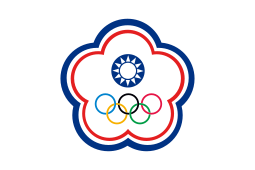Chinese Taipei Olympic flag
 | |
| 梅花旗, literally "Plum Blossom Banner" | |
| Use | Civil and state flag, civil and state ensign |
|---|---|
| Proportion | 2:3 |
| Adopted | 1980 |
| Design | A Blue Sky with a White Sun emblem with the Olympic rings, encircled by a five-petaled Prunus mei (the ROC's national flower) drawn in red, white, and blue. |

 |
|---|
|
|
The Chinese Taipei Olympic flag is used by the Republic of China (ROC) Taiwan team, which competes under the title "Chinese Taipei" during the Olympic Games and other events, in place of the flag of the Republic of China. This is a result of the complex Cross-Strait relations between the Republic of China and the People's Republic of China. The Olympic flag has been in use since 1980, following the decision by the International Olympic Committee that the ROC could not compete under the country's name or flag.
Due to this restriction, the National Anthem of the Republic of China also could not be played when the team wins medals, so, instead, the National Flag Anthem of the Republic of China was played during the flag raising of the medal ceremony.
The flag shows the Blue Sky with a White Sun (the emblem of the Republic of China and the Kuomintang) and the Olympic rings, encircled by a five-petaled Prunus mei (the ROC's national flower) drawn in red, white, and blue (the colors of the ROC flag).[1]
Court case over IOC decision
The IOC adopted the Nagoya Resolution in November 1979 which called for the "Republic of China Olympic Committee" would have to change its name to the "Chinese Taipei Olympic Committee" and adopt a new flag and anthem if it wanted to participate in the Olympic Games. The ROC strongly disagreed with the decision and sued the IOC in Switzerland.[2] The ROC claimed that the conditions concerning its name, flag, and anthem violated articles 6, 64, and 66 of the Olympic Charter. However, despite appealing an initial court judgment, the ROC was not successful. On January 15, 1980, a Swiss court rejected the ROC effort to remain in the Olympic movement under the name of "Republic of China."[3][4][5]
After a series of forceful objections, Taiwan officially accepted the compromise in 1981, and the island competed in its first Olympics in 1984, at the 1984 Winter Olympics in Sarajevo, SFR Yugoslavia.[6]
Other flags
For other Olympic-affiliated and international sporting events, Taiwan uses variations on the Olympic flag:
- The Paralympic flag replaces the Olympic rings with the logo of the International Paralympic Committee
- The Deaflympics flag replaces the Olympic rings with a green Chinese dragon and the words "Chinese Taipei"
- The flag of the Chinese Taipei national football team replaces the Olympic rings with the taijitu (the yin and yang symbol), with the black and white dots replaced with footballs
- The Universiade flag replaces the Olympic rings with the letter U (from the logo of the FISU) and has an electric blue background
- The flag of both the Chinese Taipei men's national volleyball team and Chinese Taipei women's national volleyball team replaces the Olympic rings with a volleyball-playing figure and the abbreviation of the Chinese Taipei Volleyball Association
Gallery
-
Flag of Chinese Taipei used in the Paralympic Games
-
Flag of Chinese Taipei used in the Deaflympics
-
Chinese Taipei football flag
-
Flag of Chinese Taipei used in the Universiade
-
Chinese Taipei volleyball flag
Former flags
-
Flag of Chinese Taipei used in the Paralympic Games (pre-2004)
-
Chinese Taipei football flag (pre-2006)
See also
References
- ^ "National Flower of the Republic of China". Government Information Office of the Republic of China. 2007-04-12. Archived from the original on 2008-05-03. Retrieved 2008-07-25.
- ^ The Times, November 24, 1979
- ^ The Times, January 17, 1980
- ^ "Taiwan requests meets court folly; Swiss gives Peking go-ahead". The Spokesman Review. 1980-01-16. Retrieved 2011-09-23.
- ^ "Swiss court dismisses Taiwan case". Bangor Daily News. 1980-01-16. Retrieved 2011-09-23.
- ^ Griffiths, James (2016-08-06). "What's in a name? Anger in Taiwan over 'Chinese Taipei' Olympics moniker". CNN. Retrieved 2016-11-11.








